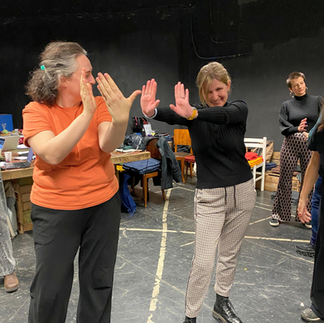Meeting in Bologna: Opening perspectives on PRISCILA’s second year!
- Marta Laureanti (Cantieri Meticci)
- Jan 13, 2025
- 2 min read
Updated: Feb 11, 2025
PRISCILA Project: Reflections from the December Transnational Partner Meeting 2 in Bologna
Between 10-12 December 2024, Bologna became the vibrant meeting point for the second Transnational Partner Meeting of the PRISCILA Project (Fostering Personal, Intercultural, Social, and Citizenship Competences for Lifelong Learning to Empower Migrant Adult Learners). Hosted at SPAZIO MET, the event gathered representatives from each partner organisation, including administrative, management, and content development teams, for an intensive journey of collaboration and strategic planning. The meeting also offered the opportunity of thematic social activities such as the visit of Bologna’s multicultural district, Bolognina, with the perspective of migrations in the city, organised with Next Generation Italy (Migrantour).

Participatory activities and further refinement of the PRISCILA Method
The meeting commenced each day with a warm-up activity facilitated by all implementing partners. The first day began with a warm welcome and an engaging ice-breaking activity led by Cantieri Meticci, setting an inspiring and inclusive tone for the day. This was followed by presentations on the outcomes of Work Packages 2 and 3 (WP2 & WP3), offering insights into the project's progress and key achievements thus far. The session allowed for further refinement of the PRISCILA Method based on Partner’s feedback.
Evaluating Progress and Setting Future Goals
A crucial part of the agenda focused on evaluating the first year of the project. Through both formal and informal evaluation activities, including questionnaires led by VHS and LXX, partners reflected on lessons learned and identified areas for improvement. The insights gathered here will guide the next phases of PRISCILA, fostering continuous growth and adaptation to learners’ needs and target group’s characteristics.
Diving into the PRISCILA Handbook for Trainers and the Multipliers
Attention then shifted to Work Package 4 (WP4), working on developing Capacity-Building workshops for adult trainers based on the PRISCILA Method created in 2024.VHS, leader of the Work Package, outlined the expected results and the strategic action plan for its implementation. Similarly, Cantieri Meticci presented the objectives and next steps for Work Package 5 (WP5), focusing on multiplier events designed to amplify PRISCILA's impact within and beyond the partner organisations. The preparation of the WP4 included also non-formal learning activities to be implemented in the Capacity-building with Trainers, which led to collective reflection on the role of trainers and facilitator in education.

Engaging Stakeholders and Strengthening Dissemination
Another highlight was the presentation of the stakeholder map and the stakeholder database, facilitated by EAEA. This tool will play a pivotal role in enhancing PRISCILA's outreach and ensuring active engagement with relevant communities. In the afternoon, dissemination strategies took center stage, with each partner sharing their efforts and plans for 2025. These discussions emphasised the importance of consistent, impactful communication to broaden the project’s reach and influence.
New Milestones: The PRISCILA Pilot Workshop Reports
In parallel with the partner meeting, we are thrilled to announce the publication of the report on our pilot workshops, which applies the PRISCILA Method, highlighting the power of artistic and participatory methods in adult learning contexts.
For more information and to access the full report, please visit our official website.
Stay connected with PRISCILA as we continue to empower migrant adult learners and foster lifelong learning across Europe.
.png)


























